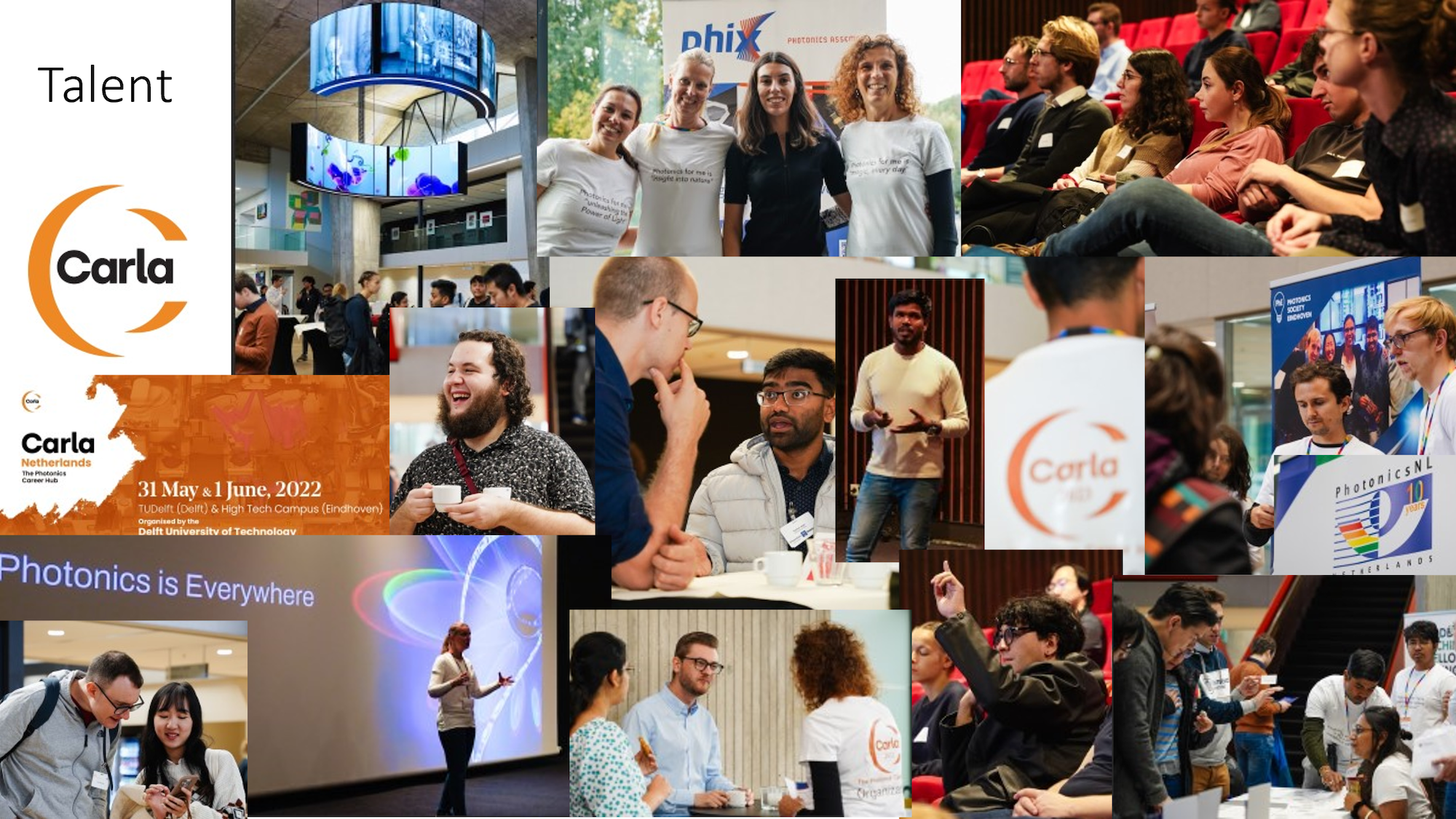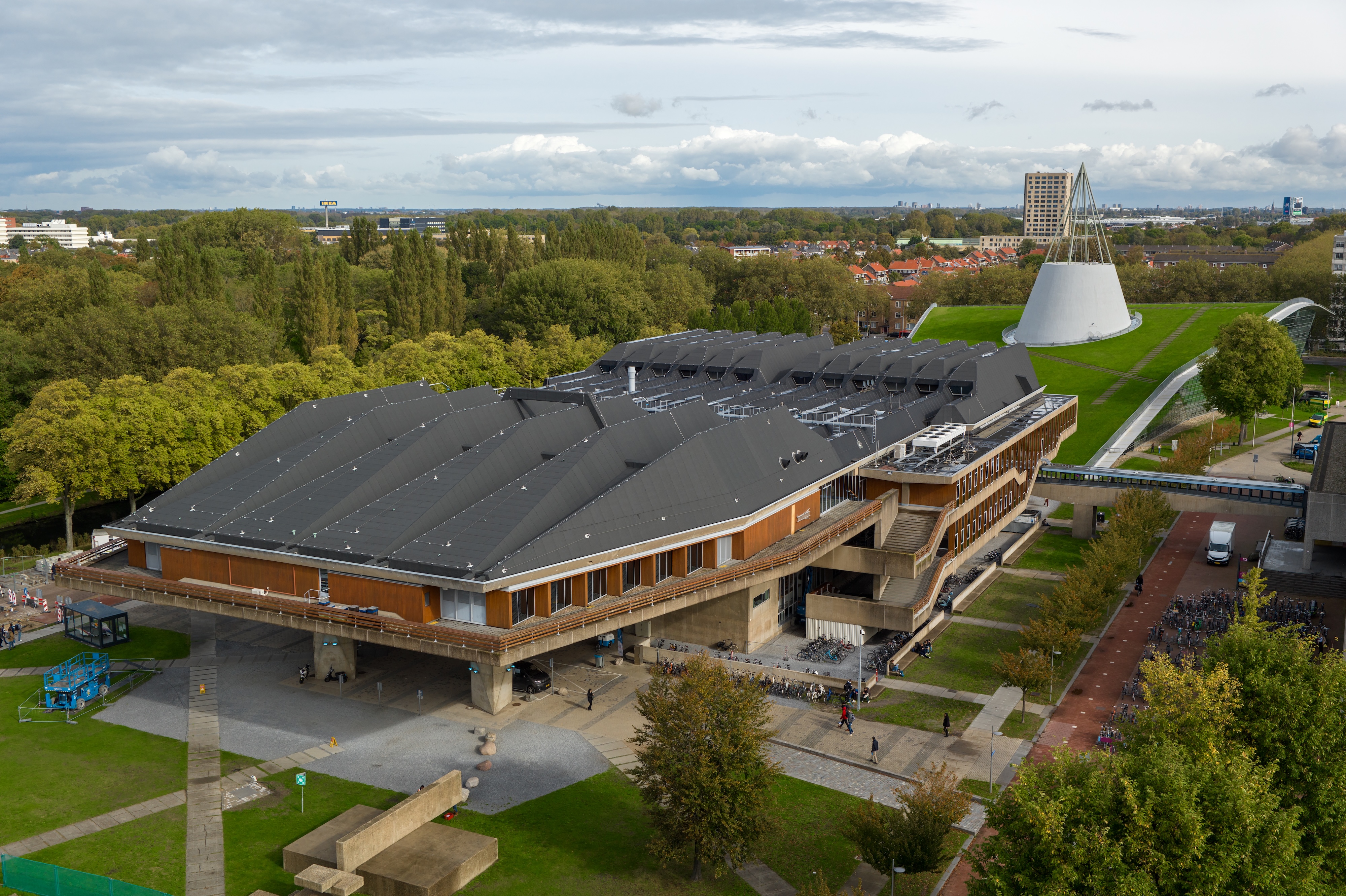
About the event
Join the Carla Symposium and Training at TU Delft
We are thrilled to invite you to this exciting event that bridges the gap between academic excellence and industry opportunities in photonics. This is your chance to explore how students (HBO, Master, PhD) like you can shape tomorrow’s technological advancements through innovative careers.
Why Attend?
Meet Potential Employers: On Day 1, we’ll host exclusive company pitches where you can connect with potential employers early on. The following companies will be represented (more to come): ASML, Airbus, Single Quantum, Wederic, Signify, PhotonDelta.
Hear Genuine Stories: On day 2, from cutting-edge research breakthroughs to industry-specific insights, our guest speakers will provide diverse perspectives on career opportunities in research. Whether in institutes, universities, research centres or industry. Scroll down to the program and speaker section for more information.
What’s In It for You?
Networking Opportunities: Connect with peers who share your passion for photonics while building connections that could lead to future opportunities.
Career Exploration: Gain insights into various career paths in photonics and related fields, helping you align your skills with industry needs.
Attendance certificate: Following the two-day event, you will receive an attendance certificate to use for your graduate school.
Additional Opportunities
Dutch Network Party: Meet with your future colleagues at the network gathering and enjoy some Dutch nibbles.
Training sessions: We have tailored workshops specifically for PhD students to prepare for your next move.
Hackathons: Test your skills and creativity under time pressure while working on innovative projects.
Lab Visits: Visit various labs at the TU Delft campus. Scroll down to the Labs section for more information.
Whether you’re looking for internships, job opportunities, or just a chance to expand your professional network, this event will help you achieve your goals. Join us and take the first step toward building your future! We look forward to welcoming you there!

The 360Carla Event is part of the CarlaHub activities. For more information about other events, please visit https://carlahub.eu.
Program
Click on a program item to read more, or scroll down for more information about the Workshops (day 1), the Labs and the Academic Speakers (day 2).
Academic speakers
Meet the academic speakers who will share more about their careers during the career pitches and panel on day 2.
Day 1 - Creating your Career
Workshops:
Workshop 1: Photonics Beyond the Lab
Discover how your passion for photonics can drive real-world change, and how you can be part of that journey!
For whom: Researchers and students eager to contribute to real-world innovation
Hosted by: Impact Studio, Pre-Incubator TU Delft
Are you a researcher curious about how your work could make a difference beyond academia? Or a (master’s) student eager to contribute their skills to deeptech innovation? This interactive workshop is your entry point into the world of science-based entrepreneurship. Discover how academic research can lead to real-world impact, and how you can play a role in that journey.
During this interactive workshop, our goals are to:
Inspire: Step beyond the academic box and explore how research and technical expertise can lead to real-world solutions. Whether you're a researcher or a student, discover how you can contribute to science-based innovation.
Empower: Learn and apply practical tools and structured brainstorming techniques to identify concrete applications and the potential impact of cutting-edge research.
Support: Get introduced to the ecosystem, tools and programmes that help bring early-stage ideas forward, from market exploration to startup development.
By the end of this workshop, you will have:
A broader perspective on how academic work and talent can impact society beyond academia.
Practical insights and strategies to navigate the entrepreneurial landscape and transform ideas into tangible outcomes.
Access to ongoing support to assist you in various ways to support your startup journey.
Whether you're ready to move your research forward or want to be part of a team shaping the future of innovation, this is where it starts.
Workshop 2: From Seeking to Signing - Your Path to Getting Hired
Have you ever thought what makes a recruiter say "We want to meet this candidate"? And what can you expect when you finally get that interview?
This interactive workshop will guide Master’s and PhD students through all the steps needed to make their job application and interview successful. From crafting a CV that grabs attention, to knowing where to find the best job opportunities, and mastering the art of the interview—this session covers it all.
You’ll learn how to present yourself with clarity and confidence and stand out from the crowd. In this workshop, you’ll also get the chance to ask the recruiter the questions you’ve always wanted to ask.
Get ready to land that job—and enjoy the process, too!
Day 2 - Shaping your Career
Labs
Lab 1: Hydrogen sensor based on fibre
PI: Lars Bannenberg
In our lab, we research and develop (materials for) optical hydrogen sensors. These sensors utilise the fact that certain metals absorb hydrogen when in contact with an atmosphere containing hydrogen. The absorption of hydrogen by the metal causes an expansion of the material and a change in its optical properties, which can be utilised in combination with optical transmission/reflectometry, surface plasmon resonances, or fibre Bragg gratings to create a sensor. During the tour, we will show you how we make these materials with thickness of 2-100 nm, how we analyze the materials using advanced characterization techniques such as X-ray Diffraction, Reflectometry, Photoelectron spectroscopy and microscopy and test the sensors in our hydrogen lab where we can simulate different environments in terms of temperature, hydrogen concentration, gas composition and humidity.
Lab 2: Optical Metrology for Aerospace (OMA) Laboratory
PI: Andrei Anisimov
The OMA Lab focuses on the development of new instrumentation for metrology applications, efficient inspection and material characterisation. It is a new research group established in 2023 at the TU Delft Faculty of Aerospace Engineering. The group bridges optics, physics, composites, and data analysis. The focus is on high-end composite materials, complex engineering cases and cultural heritage. All activities are done in close contact with end-users and commercial technology providers. The main techniques include shearography, speckle interferometry and machine vision.
Lab 3: Aerospace Non-Destructive Testing Laboratory
PI: Roger Groves
The laboratory focuses on developing innovative non-destructive testing (NDT) techniques, fibre optic sensing, optical coherence tomography and hyperspectral imaging. These methods enable the detection and characterisation of defects and damage in composite materials and aerospace structures. The lab collaborates extensively with industry partners and academic institutions, supporting aerospace safety, structural health monitoring, and sustainable aviation.
Lab 4: Rossi Lab
PI: Massimiliano Rossi
In our lab, we levitated nano-objects using optical tweezers and studied their motion in extreme isolation. We aim to prepare and observe macroscopic quantum dynamics at even larger mass and distance scales. Our research combines fundamental and technological aspects: to answer the fundamental questions in quantum physics about the classical-to-quantum transition, we are developing novel quantum technologies for sensing. Massimiliano Rossi is a young PI who moved to TU Delft last year to establish his own research group and direction. The group is dynamic and seeks to expand, welcoming more students and scientists.
Lab 5: Sustainable Aircraft Propulsion Lab
PI: Francesca De Domenico
Our core mission is to develop clean and stable combustion systems for the future of aviation. To support this goal, we are advancing state-of-the-art combustion diagnostics. Our lab is equipped with a femtosecond laser system used for Coherent Anti-Stokes Raman Spectroscopy (CARS) and other spectroscopic techniques, enabling precise measurements of temperature and major species in flames. In addition, we employ more conventional diagnostics, such as Laser-Induced Fluorescence (LIF), to visualise flame structures and combustion products.
Lab 6: Scatterometry Lab
PI: Silvania Pereira
The lab features several setups of coherent Fourier scatterometry, an optical technique used for non-destructive characterisation of nanostructures.
Lab 7: The Brinks Lab
PI: Daan Brinks
We address neuroscience questions through functional imaging. Some of the projects we work on are the optimisation and expression of fluorescent proteins called Genetically Encoded Voltage Indicators (GEVIs). These proteins can be expressed in neurons and used to visualise their electrical activity. This enables us to measure the activity of brain cells with unprecedented resolution and throughput using fluorescence microscopy. In our lab, we have a custom-built microscope called 'the Octoscope', optimised for this purpose. The Octoscope enables imaging of brain cells with optical patterning in either 1-photon or 2-photon excitation mode, with millisecond time resolution. The Octoscope also features an integrated electrophysiology setup, enabling simultaneous electrical recording or stimulation during imaging.
Lab 8: Optics Lab from Space Instrumentation
PI: Jerome Loicq
We develop optical setups intending to improve remote sensing from space and space optics in general. Currently, an interesting setup is the spectropolarimetric modulator by Bogdan Vasilescu. It allows for full strokes spectropolarimetry.
Lab 9: Rooftop Lab
PI: Rudolf Saathof
The new optical Telescope on the roof of the Aerospace building. Currently, two PhD students are working there on free space optical communication and atmospheric turbulence.
Lab 10: Errando Herranz Lab
PI: Errando Herranz
TQuantum technologies promise to better our lives via drastic improvements in tasks such as optimization and factoring, cryptography, and the development of new chemicals and materials. These applications require quantum technologies with a very high complexity, but today’s technologies fall short on scalability. A leading technology is based on optical entanglement of quantum memories in the solid state. This requires exquisite control of light and matter in the atomic scale in systems scalable to thousands of qubits. In the Errando Herranz Lab, we aim to achieve this goal by developing large-scale quantum photonic integrated circuits based on the same processes that make the chips in your smartphone, and spin quantum memories in silicon operating at the same optical wavelength as the internet.
This event is sponsored by



This project has received funding from the European Union Horizon Europe research and innovation program under grant agreement No 101135838.

Location
TU Delft Aula Conference Centre
Mekelweg 5
2628 CC Delft
The Netherlands
#CARLA2025
CARLA 360 2025 - visitor registration
 Registration website for CARLA 360 2025 - visitor registration
Registration website for CARLA 360 2025 - visitor registrationCARLA 360 2025 - visitor registrationa.peters@tudelft.nl
CARLA 360 2025 - visitor registrationa.peters@tudelft.nlhttps://www.aanmelder.nl/carla2025
2025-08-28
2025-08-29
OfflineEventAttendanceMode
EventScheduled
CARLA 360 2025 - visitor registrationCARLA 360 2025 - visitor registration0.00EUROnlineOnly2019-01-01T00:00:00Z
To be announcedTo be announced